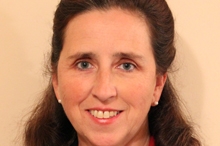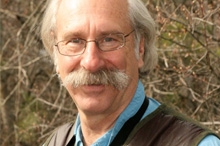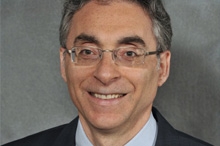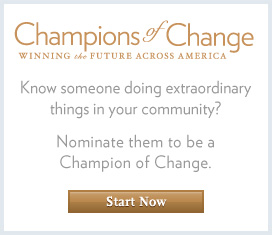Champions of Change Blog
Proudly Supporting Farming and Ranching Families
Posted by on August 4, 2014 at 9:44 AM EDT
Desiree Wineland is being honored as a Future of American Agriculture Champion of Change.
My story in agriculture begins out of the ashes of September 11, 2001, and because of a promise my husband Cal and I made to our two boys, who were at the Pentagon Day Care that day. This promise transplanted our family to the heart of America, Nebraska, where the heart of agriculture beats strongly.
Although we did not know much about agriculture when we arrived, we completed UNL's Cow/Calf College, then the Nebraska Ranch Practicum and were selected for the Nebraska LEAD program, which opened up the world of agriculture to us.
For the past three years we partnered with the American Chemical Society to help promote education in agriculture and chartered a high school ChemClub utilizing our vineyard as a field lab to promote "STEAM" STEM with an A for Agriculture! Veterans Vineyard is also in its third year enrolled in the USDA/NRCS- Conservation Stewardship Program and hosts the Veterans BBQ in the Vineyard on every Armed Forces Day.
In 2011, to assist rural small family farms and ranches, we established American Butchers, a small USDA meat processing facility and butcher shop that is able to support these legacy farms through helping them market and sell their farm raised products that have been handcrafted into delicious artisan meats and shipped across the country. American Butchers is also a proud supporter of the Farm to School program.
It is humbling to be recognized for this Champions of Change award because change is truly like agriculture and does not happen in a vacuum. A seed is planted and only sprouts because of many external factors working in concert. For me, this award represents the teamwork of an entire state and love of my family. Together we will bring this recognition back to Nebraska to share it with all those who made this possible. We are still a work in progress, and know that with this continued support the possibilities are endless.
There are so many who contributed and I would like to begin with those closest to home and work outward. Thank you Cal, Calvin, Austin and even Honor. Your love and support keeps me growing every day. Thank you to everyone involved in the following organizations for your nourishment touched our lives and made this possible: Nebraska LEAD program, LEAD 31, UNL extension centers, Beaver City Farm Service Agency, Nebraska Farm Bureau, Nebraska Cattlemen, Gallup EAS, FFA, Nebraska Diplomats, Google, Women In Ag, ISG, V-WISE, VFW and the American Legion and most importantly our neighboring communities who placed their trust in us and allowed us to grow and help sustain others in agriculture.
Thank you to USDA for providing the tools that extended all the way out to our farm in rural Nebraska. The USDA website shares collected knowledge, which provided steadfast answers to how to manage droughts, extreme heat waves, and early frosts.
Another great partner with USDA is Small Business Administration, and they also deserve a thank you, especially to all those who filled their website with answers to every question I have had about running a business.
And to the "First Team"- Mrs. Obama, thank you for planting a garden and showing not only your daughters but the world the value of agriculture and importance of nutritional foods.
Mr. President, I have read and learned about so many other champions and the work each one contributes to making our Nation continue to grow and I intend to connect and to learn from many of them. Thank you, Sir, for all that you do to reach out and recognize our citizens.
Desiree Wineland is originally from Sweden and now resides in Nebraska. She retired from the United States Army in 2009 and has since started two small rural businesses, American Butchers and Veterans' Vineyard & Winery.
Learn more aboutNominate a White House Champion of Change for Veteran Entrepreneurship
Posted by on June 10, 2014 at 5:03 PM EDTSince taking office, President Obama has been committed to upholding our sacred trust with America’s veterans and wounded warriors. As the President stated in his last State of the Union address, “We’ll keep working to help all our veterans translate their skills and leadership into jobs here at home. And we all continue to join forces to honor and support our remarkable military families.” Entrepreneurs and small businesses are a big driver of our national economy, and veterans offer our country a set of skills that make them uniquely well suited for success as entrepreneurs. Research demonstrates that veterans are at least 45 percent more likely than those with no active-duty military experience to be self-employed and are twice as likely to succeed. According to the most recent U.S. census data, nearly one in 10 small businesses are veteran-owned. These businesses generate over $1.2 trillion in receipts annually and employ nearly 5.8 million Americans. It is in the best interest of our country to tap into this incredible resource of veterans and find ways to help them succeed as entrepreneurs who fuel job growth and expand opportunity for all Americans.
Recognizing the need to fuel this entrepreneurial spirit in our service members, the President launched Boots to Business – an intensive entrepreneurship education program for transitioning service members to learn how to start a small business. To date, Boots to Business, delivered by the Small Business Administration, has trained more than 6,000 transitioning service members on how to start a business, while also informing them of the network of resources available to them, such as access to capital.
However, this is only one step along the path to providing opportunities for veterans to become successful entrepreneurs. Therefore, the administration would like to honor those who have supported this effort by serving as examples and demonstrating their desire to help other veteran entrepreneurs.
Today, we’re asking you to help us identify and honor veteran entrepreneurs and veteran spouses who are entrepreneurs or organizations that support veteran entrepreneurs by nominating a Champion of Change for Veteran Entrepreneurship by midnight on June 24th. Nominees may include:
- Veterans who have started a for-profit or non-profit business.
- Veteran spouses who have started their own business.
- Organizations that support veteran entrepreneurs by providing them with skills, capital, or other necessary resources.
Click on the link below to submit your nomination (be sure to choose Veteran Entrepreneurship in the "Theme of Service" field of the nomination form).
Nominate a Veteran Entrepreneurship Champion of Change
We are looking forward to hosting this event and to highlighting the achievements of the veteran entrepreneurship community.
Robert McFarlin is a White House Fellow at the National Economic Council.
Learn more about VeteransNominate a White House Champion of Change for Raising the Wage
Posted by on May 29, 2014 at 12:21 PM EDTIn his 2014 State of the Union, President Obama announced, “It’s time to give Americans a raise.” President Obama called on Congress to raise the national minimum wage from $7.25 to $10.10 an hour and index it to inflation. The President has also made clear that even as he continues to try to work with Congress, he won’t wait for them to act. That’s why, in the meantime, the President has worked with business leaders, governors, mayors, and activists to find ways to raise wages for millions of working Americans.
As part of the White House Year of Action, the President has signed an Executive Order to raise the minimum wage to $10.10 for individuals working on new federal service contracts, introduced a new rule to expand access to overtime pay, and two new Executive Orders protecting workers from retaliation and encouraging equal and fair pay.
The reality for too many Americans is that they are working harder and longer and still struggling to get by. No American should be working 40 hours a week and still have to live or raise a family in poverty. The face of the minimum wage has changed; nearly 90 percent of the workers who would benefit from raising the minimum wage to $10.10 an hour are 20 years old or older, and the average age is 35 years old. More than a third are married, and over a quarter are parents. In fact, nearly 16 million children have at least one parent whose paycheck would increase as a result of passing this legislation.
Raising the minimum wage nationwide will increase earnings for millions of workers, giving them more money to spend in the community, and boost the bottom lines of businesses across the country.
Today, we’re asking you to help us identify and honor local leaders and ordinary Americans taking initiative, often at great personal sacrifice to raise wages for working women and men around the country. Nominate a Champion of Change for Raising the Wage by midnight on Wednesday, June 11. Nominees may include:
- Community leaders who worked to raise wages in their city or state
- Citizens who have raised wages at their own business
- Advocates who fought for better pay and benefits on the job
- Community leaders who helped to organize grassroots efforts around this issue
- Citizens who created innovative tactics to engage the public to support raising wages
Click on the link below to submit your nomination (be sure to choose Raising the Wage in the "Theme of Service" field of the nomination form):
http://obamawhitehouse.archives.gov/champions/nominate/
We are looking forward to hosting this event and to highlighting the great work communities across the country are doing to advance fairness, opportunity, and stability for America’s working families.
Carri Twigg Is Associate Director of the Office of Public Engagement.
Building Walkable Communities
Posted by on May 20, 2014 at 4:08 PM EDT
Dan Burden is being honored as a Transportation Ladders of Opportunity Champion of Change.
When I was a child in the 50’s my legs (and later my bicycle) gave me freedom to explore distant farms, ponds, creeks, woods, and the homes of many friends. Frequent busses gave me access to my entire city. From this start, I grew a healthy social network and became energized. Then our nation shifted its ways, and for sixty years, mobility switched almost entirely to moving people in cars. Tens of thousands of neighborhoods declined as people fled central cities for greener suburbs. Historic, character-defining buildings began to rot. I returned to my childhood neighborhood recently and truly shed tears for what was lost.
Halfway from then to now, in 1980, I had an epiphany. While in Australia, also an auto-served nation, I noticed that all their neighborhoods were intact. What was the difference? They had people, and they had cars. I came back to Florida, already seated as the state’s first full time Bicycle Coordinator and without asking permission, changed my job title to “State Pedestrian and Bicycle Coordinator.” This simple change started transformation inside those transportation hallways. Sixteen years later, realizing I needed broader stage, I took to all of North America’s roads almost without pause for the last eighteen years, working in 3,500 towns on people-focused transportation with enhanced car mobility. Through this process, I learned that by offering choices, especially in urban design, not only do pedestrians, bicyclists and transit riders win, so do drivers and local economies. Building sidewalks or trails, for instance, adds value to homes and 7 times more jobs into communities than equal money spent on freeway ramps.
Transportation patterns have always played a critical role in shaping our cities – from foot traffic, to horses, trolleys, canals, railroads, trucks, cars and planes. It’s not surprising that increased mobility in the form of automobile use, led to sprawling cities. Unintended consequences were vast: dying city centers, social isolation, unaffordable roadway systems and separated communities. We have learned a lot since 1950, but maybe the most remarkable lesson is that we are social creatures who need one another to find value and happiness in our lives.
Motorist rebellions against my crusades for walkable communities have not developed. The last thing today's motorists want is growth of traffic. Most taxpayers know instinctively that our road costs have hit the financial breaking point – potholes grow and repaving is forever delayed. Sixty years of limited transportation choice has taught us that building more roads induces more traffic, delay, lost productivity, sprawling communities and increasing waistlines. The answer, actually, is very simple: build robust, revitalized cities with greener, lower speed, inclusive streets that invite maximum exchange (social, retail, jobs and activities) with minimized trip lengths. Build walkable communities.
Growing populations of millennials and retiring boomers, want proximity to goods, services and intact neighborhoods. Seniors are now likely to outlive their abilities to drive cars by 7 to14 years, and they want to age where they currently live. All of us – no matter our age – seek freedom and independence. As much as 80 percent of our built landscape is now suburban, and many of these sprawled places can be saved through mixed-use centers and villages of defining character. Across this country, citizens notice that their health and bank balances are deteriorating from their daily transportation choices. By and large, Americans are tired of wasted hours sitting in traffic, book-ending their work days in frustration, and unsustainable costs, both personal and planetary. Once informed, they advocate for communities through transportation rather than transportation through communities.
Dan Burden is the Director of Innovation and Inspiration at the Walkable and Livable Communities Institute.
Improving Safety and Quality of Travel for the Flying Public
Posted by on May 20, 2014 at 4:02 PM EDT
Flavio Leo is being honored as a Transportation Ladders of Opportunity Champion of Change.
As deputy director of aviation planning and strategy at the Massachusetts Port Authority (Massport), which owns and operates Boston Logan International Airport, my work balances two, often competing interests: the continuous improvement in safety and quality of travel for the flying public; and the mitigation of airport impacts on local neighbors who bear a burden of the indispensable role airports play in today’s global economy. Receiving the White House Champions of Change Award provides an opportunity for me to underscore the importance of successful community engagement if we, as an industry, are to continue to grow.
Logan Airport contributes substantially to the local and regional economy. Logan Airport is also an urban airport near downtown Boston with residential neighbors literally next door. Logan’s flight paths overfly a geographically and demographically diverse greater Boston region. It is no surprise, therefore, that addressing community concerns, sharing information and looking for opportunities to lessen impacts is an integral part of Logan’s DNA.
These were the challenging dynamics that attracted me to aviation work in the first place. Massport has a long history of community engagement. At times it has been contentious. One of the first projects I worked on involved airfield improvements at Logan. The process was long, technically challenging -- and controversial, with extensive community interest and engagement. The lesson I took away from this project was that neither airports nor the communities impacted by them are going away any time soon. Both will be forever linked.
As an aviation professional, I am determined to achieve the highest level of safety and customer service standards for the traveling public. I also recognize that citizens from impacted communities value the airport while, for the most part, they are trying to do what is right for their community as they engage responsible local and federal agencies on what are generally very technical issues for a lay person.
Avoiding conflict entirely is difficult. But that does not mean airports and local communities cannot find common ground in a community engagement process that is open, honest, fact-based and credible. That is my hope at any rate.
For example, when the FAA was rolling out the next generation flight procedures at Logan, it took a lot of time and involved significant resources to achieve community buy-in on an issue that was technically complicated. The new procedures have been implemented. Based on this positive dialogue we had with residents, I also believe the new procedures do address significant community goals. The process is still ongoing and provides a clear roadmap for further success.
For example, I work with local think-tanks, the FAA and our airline partners to offer Boston Logan as a laboratory for testing innovative concepts such as MIT’s approach to surface queue management, or the USDOT Volpe Center’s measuring of wake vortex formation and noise modeling algorithms, or JetBlue’s late night advanced procedure that try to avoid heavily populated areas. Based on the feedback we’ve received from the community, we have enhanced our website to help the public better understand the decisions airport operators make by explaining how our airport and airspace work.
When it comes to mitigating impacts, at Boston Logan we have already picked the “low hanging fruit.” We have soundproofed homes near the airport; adopted better abatement procedures; and aircraft manufacturers have designed cleaner and quieter aircraft engines. Future “silver bullet” solutions to airport impacts will be hard to find if they exist at all, and so we must look for the incremental opportunities available to us from a more informed dialogue with our communities.
Flavio Leo is the Deputy Director of Aviation Planning and Strategy at the Massachusetts Port Authority.
Fostering Partnerships to Grow a Business in Transportation
Posted by on May 20, 2014 at 3:59 PM EDT
Susan Park Rani is being honored as a Transportation Ladders of Opportunity Champion of Change.
I am truly honored to be a White House Champion of Change and to have the opportunity to take part in this event.
Like education, public safety, and health and wellness, transportation is a critically important bipartisan issue facing our nation. Moving goods and people to their destinations efficiently and effectively gives our nation the competitive advantage it needs to compete and thrive in the global marketplace today. This is an important and exciting sector of the economy where much innovation in planning, design, and project delivery is destined to provide a greater positive economic impact than in days past.
I began my career as a professional engineer/business owner when there were no female minority engineering firms in Minnesota. As a pioneer, I looked for creative ways to partner with other firms, engaged in trade and business association with the goal of making a difference in my community. I did not start out with the sole intent to create jobs, but today that is exactly what Rani Engineering is doing for our community.
From the start, I knew that I had much to learn about the business of consulting engineering and that I needed to find ways to get my foot in the door on new projects. Being a minority female owned engineering firm gave me both a challenge and a great opportunity. The opportunity was that given the economic development goals identified on federally funded transportation projects, we had a chance to compete and earn business. Our company began by securing small contracts working as a sub-consultant to larger established engineering firms in the community. With time, we accumulated a growing list of successful projects and earned our reputation for quality work and name recognition. Successful project completion invited more invitations for greater participation on larger projects. This also allowed our firm to establish trusted relationships and partnerships in the engineering and transportation community. At the same time, we sought to be active in both trade and business associations on the board level. Those organizations included St. Paul Area Chamber of Commerce, American Consulting Engineering Companies, MN, Association of Women Contractors and National Association of Minority Contractors.
Another important decision was to join the City of St. Paul Mayor’s taskforce established to engage with the businesses along the Central Corridor Light Rail Transit (Green Line) in developing a land use framework that would affect the project well before the design effort. This participation resulted in Rani Engineering being chosen to join the team that ultimately won the design contract. Since that time, we have had the opportunity to work on three major light rail transit (LRT) projects in the Twin Cities Metropolitan area and this gave us a chance to start and grow a rail signal niche. Future transit rail and other transportation improvement projects are expected, so we continue to work diligently to earn business, develop and deepen relationships and to grow within our community.
Today we are a mature firm with over 20 years of history and unlike in the days I began Rani Engineering, there are many women owned and/or minority firms successfully navigating and thriving in the transportation consulting industry in our community.
Susan Park Rani is Founder and President of Rani Engineering Inc. A DBE Certified firm specializing in Civil Engineering, Land Surveying, and Rail Signal Services.
- &lsaquo previous
- …
- 19
- 20
- 21
- 22
- 23
- 24
- 25
- 26
- 27
- …
- next &rsaquo

